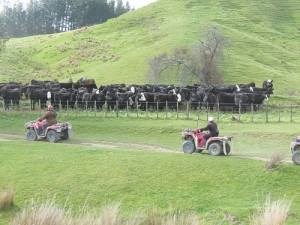Once again, it has been a year of pleasing results from industry, incidents and the dairy sector, the annual compliance monitoring report compiled by Environment Southland has found.
Compliance manager Simon Mapp says Southland's significant non-compliance rate is one of the lowest in the country.
For the third year in a row there has been a reduction in significant non-compliance on effluent discharge consents. The rate of significant non-compliance is now at 4.5%, down from 6% last year.
Southland industries continue to perform well, with NZAS, Meridian Energy and Solid Energy setting a good standard for environmental compliance. Mapp says it was also pleasing to see the improvement made by Takitimu Coal and Pioneer Energy.
Regulatory Services committee chairman Neville Cook says it's really good to see the steady improvements. "It shows that the educative programme is working. If we inform people better, then they'll try and comply with the rules and get the results everyone wants for the environment."
In the coming year the compliance division will be taking an education-first approach to the implementation of the Proposed Regional Air Plan as they support the change in home heating with the goal of improving air quality.











